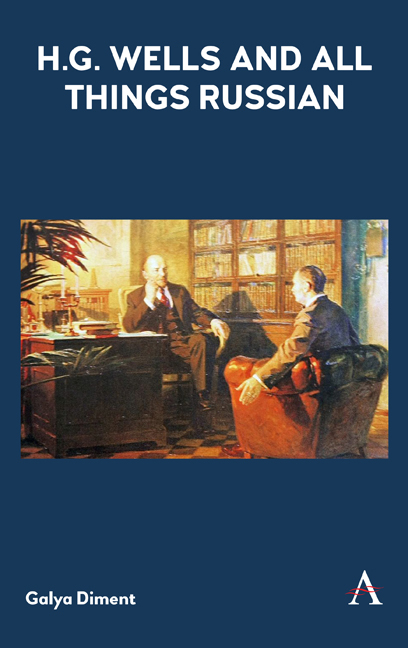Book contents
- Frontmatter
- Dedication
- Contents
- List of Illustrations
- Acknowledgments
- List of Contributors
- A Note on Transliteration
- Introduction: “The Wells Effect”
- Part One WELLS IN RUSSIA: PRE-WORLD WAR II
- Part Two WELLS IN RUSSIA: POST-WORLD WAR II
- Part Three RUSSIA IN WELLS
- Chapter Seven Present Tense Arguments: Russia and H. G. Wells's Babes in the Darkling Wood
- Chapter Eight Wells and Gorky
- Chapter Nine Odette Keun Versus H. G. Wells on Russia
- APPENDIX TRANSLATIONS
- Bibliography
- Wells, Herbert George – Works Index
- General Index
Chapter Eight - Wells and Gorky
from Part Three - RUSSIA IN WELLS
Published online by Cambridge University Press: 06 September 2019
- Frontmatter
- Dedication
- Contents
- List of Illustrations
- Acknowledgments
- List of Contributors
- A Note on Transliteration
- Introduction: “The Wells Effect”
- Part One WELLS IN RUSSIA: PRE-WORLD WAR II
- Part Two WELLS IN RUSSIA: POST-WORLD WAR II
- Part Three RUSSIA IN WELLS
- Chapter Seven Present Tense Arguments: Russia and H. G. Wells's Babes in the Darkling Wood
- Chapter Eight Wells and Gorky
- Chapter Nine Odette Keun Versus H. G. Wells on Russia
- APPENDIX TRANSLATIONS
- Bibliography
- Wells, Herbert George – Works Index
- General Index
Summary
Russia is to the young intellectuals of to-day what Italy was to the Victorians.
— Rebecca West, “The Barbarian's” (1915)There is something in the Russia-ness of Russia that often seems to intoxicate.
— China Miéville, October (2017)H. G. Wells and Maxim Gorky seem to have been destined for a friendship from the start because of similarities in their upbringing and affinities in their political and professional views. To begin, Gorky and Wells both came from impoverished circumstances, Gorky from a fatherless family (he was three when his father died of cholera) that lived in constant need, and Wells from the family of a ne'er-do-well tradesman who was persistently penniless. Like Gorky, Wells believed that the condition of the oppressed or underprivileged resulted from class divisions, material conditions and political exploitation and they must be removed. Gorky once remarked that “when work is a pleasure, life is a joy! When work is a duty, life is slavery.” Consequently, both Gorky and Wells wrote about lower-class life, Gorky in The Lower Depths and Wells in Kipps and the History of Mr. Polly, and both criticized the distribution of wealth. They sought to abolish class barriers predicting a new equality of opportunities with Wells's A Modern Utopia (1905) outlining a country where the state owned all property, and the equality of the sexes existed.
Gorky and Wells were resilient and optimistic about social change, Gorky proclaiming that “everybody, my friend, everybody lives for something better to come. That's why we want to be considerate of every man.” As Gorky wrote to Wells in March 1917, “People have to be made to understand that they are the builders and masters of the world, that they are responsible for all the misfortunes in the world and, at the same time, that everything good on earth is their own doing.” (An ironic postscript read “P.S. The revolution held up this letter” but that “I hope that you will be glad of the birth of the new democratic state.”)
They were also men of big ideas. Marking this for Gorky was his World Publishing project, reprinting and translating nearly three thousand volumes of European literature with an emphasis on the nineteenth century, followed by numerous books on science.
- Type
- Chapter
- Information
- H. G. Wells and All Things Russian , pp. 143 - 156Publisher: Anthem PressPrint publication year: 2019



